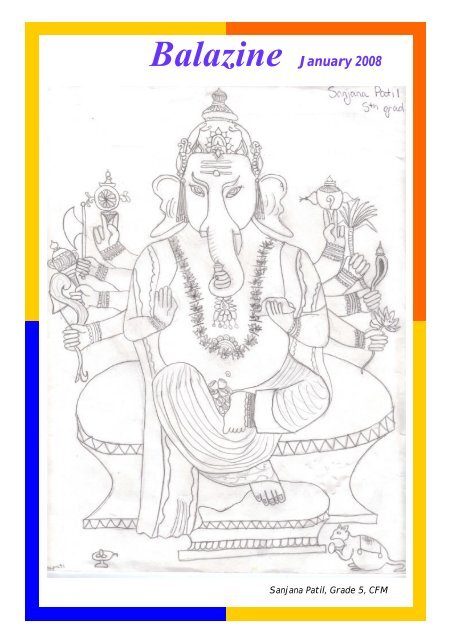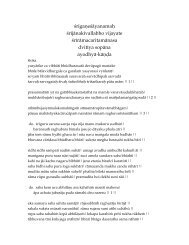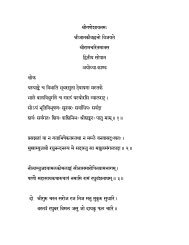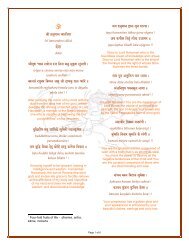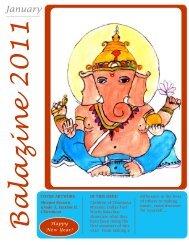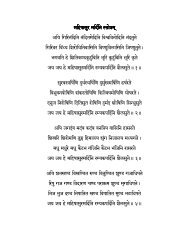Balazine January 2008
Balazine January 2008
Balazine January 2008
Create successful ePaper yourself
Turn your PDF publications into a flip-book with our unique Google optimized e-Paper software.
<strong>Balazine</strong> <strong>January</strong> <strong>2008</strong><br />
Sanjana Patil, Grade 5, CFM
Hari Om,<br />
<strong>Balazine</strong> <strong>January</strong> <strong>2008</strong><br />
… from Editor’s Desk<br />
Welcome, to all readers of <strong>Balazine</strong>, from your guest editor, Aditya Rahalkar.<br />
In this issue’s editorial, I would like to focus on the “power of prayer” and it’s<br />
importance in our troubled times. War and wild fires, droughts and floods, hurricanes<br />
and tornados are all part of the daily news on television. Weather patterns are<br />
becoming more & more erratic. What we are witnessing is a planet in peril.<br />
But, there is good news too. Our lives can change for the better if we pray daily,<br />
not just for ourselves, but for others also. It is said that a sincere and deep prayer<br />
has infinite healing power. Therefore, I am going to share with you a prayer that my<br />
grandfather taught me. It is called Prarthana Mantra:<br />
SwastiPrajabhyaha PariPalayantam |<br />
Nyayyena Margena Maheem Maheeshaha ||<br />
Go-Brahmanebhyaha Shubhamastu Nityam |<br />
Lokaha Samstaha Sukhino Bhavantu ||<br />
Kale Varshtu Parjanyaha | Pruthivee Sasyashalini ||<br />
DeshoYam Kshobha Rahitam | Brahmanassantu Nirbhayaha ||<br />
The meaning of this prayer is as follows –<br />
May everything be well with citizens of the world.<br />
May all the leaders lead, serve and govern in the righteous and just manner.<br />
Let there be abundance, prosperity & peace for all mankind as well as all creatures.<br />
May all the lokas rejoice in happiness.<br />
May rain fall on time so that the earth has abundance of food, greenery & life<br />
Let this land is free of want and agitation.<br />
On such a peaceful planet may all god seeking people live without fear.<br />
Our sages have given us this powerful & timeless prayer. Let us all chant this<br />
prayer every day, so this beautiful earth of ours can heal.<br />
Om Tat Sat !<br />
In this issue ….<br />
• Power of Prayer<br />
• Poems & jokes<br />
• Art galore<br />
• If God came to my house<br />
• Trips to India<br />
Aditya Rahalkar, Grade 9, Session II<br />
• Power of forgiveness<br />
• Stories on Ganesha and Shiva Parvati<br />
• Freedom fighters<br />
• Shlokathon<br />
and much more ...
<strong>Balazine</strong> <strong>January</strong> <strong>2008</strong><br />
Parinita Kapoor, Grade 1, Session III Alisha Sansguiri, Grade 4, Session III<br />
Swati Ravi, Grade 3, Session III Sahana Vathsa, Grade 5, Session III
Subha Cherukupalli, Grade 1, CFM<br />
Do I have to wear a paavaadai?<br />
<strong>Balazine</strong> <strong>January</strong> <strong>2008</strong><br />
Do I have to wear a paavaadai?<br />
It is not comfortable for me<br />
Sorry mom, sorry mom<br />
that's just my little gene<br />
I would rather wear a salwar kameez<br />
It would be pleasant for me.<br />
Oh come on, oh come on,<br />
I would be happier with glee<br />
Salwar kameez, sparkle<br />
paavaadai; plop<br />
Can't I wear a salwar kameez<br />
I won't even flop!<br />
Devika Iyer, Grade 4, Session II<br />
Poem in praise of Goddess Durga<br />
Durga Devi you are so strong<br />
You destroy demons like Mahishasur<br />
And huge as King Kong<br />
To let right rule over wrong<br />
You teach us important Lessons<br />
Of universal brotherhood<br />
And to constantly sing love’s songs<br />
You are our shining light and guide<br />
To you we wholeheartedly belong<br />
I pray your name is always on my tongue<br />
To your bhajans I constantly sing along<br />
To all the friends I walk among<br />
I say keep Durga Devi in your hearts<br />
lifelong<br />
Ananya Narimetla, Grade 5, Session III<br />
Subramanyam Bharatiyar<br />
Vishruthi Ramaswamy, Grade 3, Session I
My Swamiji<br />
You help us when we need you,<br />
You tell us what to do.<br />
You care, advise and teach us,<br />
We love and respect you<br />
You know what is best for us,<br />
You make us strong and bright.<br />
And because of all your teachings,<br />
We know what's wrong and right.<br />
You're always very happy,<br />
And now we are too.<br />
We learnt all we could,<br />
And we will miss you!<br />
<strong>Balazine</strong> <strong>January</strong> <strong>2008</strong><br />
Manasa Muppirala, Grade 3, CFM<br />
Think about it<br />
Q. Why did the football coach go to the<br />
bank?<br />
A. To get his quarterback!<br />
Q. What did the pencil say to the sharpener?<br />
A. Stop going around and around, just get<br />
to the point!<br />
Q. Why are fish so smart?<br />
A. Because they live in a school!<br />
Q. What is a tree's worst month?<br />
A. Sep-tim-ber!<br />
Q. What kind of noise does a tree make?<br />
A. bark,bark<br />
Ganapati Bappa<br />
Rahul Naik, Grade 1, Session III<br />
Have you ever heard of Ganapati Bappa? Well let me tell you some things<br />
about the famous god. Like for instance did you know that Ganapati Bappa was<br />
once a real boy? Did you know that Ganapati Bappa has an older brother named<br />
Kartikeya?<br />
Do you travel in a car to move everywhere? Ganapati Bappa does too! But he<br />
doesn’t use a car, he uses a mouse! His mouse can zoom around very, very fast.<br />
Do you like to eat modakas? Well that just happens to be Ganapati Bappa’s favorite<br />
food! Usually at Ganapati Bappa’s festival we serve 21 modakas to get his blessings<br />
for good education and for getting rid of our sorrows.<br />
I hope you have learnt a lot about the great god Ganapati Bappa!<br />
Advait Prabhudesai, Grade 5, Session III
<strong>Balazine</strong> <strong>January</strong> <strong>2008</strong><br />
Shiva - Parvati<br />
Swetha Berana, Grade 2, Session III
<strong>Balazine</strong> <strong>January</strong> <strong>2008</strong><br />
What Om means to me<br />
Suyash Prabhugaonkar, Grade 3, Session III<br />
Balvihar is Fun<br />
Divya Sinha, KG, Session III
My India Trip<br />
In the summer of 2007 I went to<br />
India. The movie Chak De India had just<br />
come out but we didn’t see it in the<br />
theaters. We met my family in Bangalore,<br />
Mumbai, and Delhi. We stopped<br />
and met the CM Noida swamijis. They<br />
were hilarious and we had a lot of fun!<br />
They told us a lot of jokes – like I<br />
should go to college.<br />
Going to Ganga<br />
The most difficult part was staying in a<br />
car for 5 hours and the best part was<br />
sitting in the waters of Ganga. The hotel<br />
was very peaceful. It was on the<br />
banks of the river Ganga. We had a fun<br />
ride in the car that took us to Manasa<br />
Devi temple on the top of the hill.<br />
Taj Mahal<br />
Our driver Dhoom Singh came late, so<br />
the people who worked at the hotel had<br />
to call him over the PA system. Those<br />
people wore turbans and had elf-like<br />
shoes that curl up at the toes. My<br />
What would I do if God came to<br />
my house?<br />
If God came to my house I would<br />
first welcome him inside. I would wash<br />
his feet, wipe them and give him something<br />
to eat. Next I would play the violin<br />
for him, sing a song and touch his<br />
feet. I would thank him for coming to<br />
my own house and ask him what I could<br />
do for him. I would ask him to play Air<br />
Hockey with me, play foosball with me,<br />
<strong>Balazine</strong> <strong>January</strong> <strong>2008</strong><br />
brother can imitate that in a very funny<br />
way. Did you know that no one actually<br />
lived in Taj Mahal? Only love lived in<br />
that place.<br />
Mathura-Vrindavan<br />
We visited Mathura and saw the jail cell<br />
that Krishna was born in. He was born<br />
more than 5000 years ago! The cell<br />
does not look old. The place was very<br />
crowded with people and I could barley<br />
see the platform! In Vrindavan Sw. Purushottamji<br />
took us to Krishna’s temple.<br />
The scariest part was when he left my<br />
hand in that crowd. Then all of a sudden<br />
out of nowhere Purushottamji came<br />
back and grabbed my hand. I didn’t<br />
know who had caught my hand and I was<br />
worried for safety reasons.<br />
I had a great time in India for 2-3<br />
weeks. I hope you also enjoy when you<br />
go there.<br />
Tanvee Asundi, Grade 3, Session I<br />
tell me stories, and play board games. I<br />
would ask him to eat some food with me.<br />
I would then ask him to bless me with<br />
happiness, smartness, bravery, powers,<br />
and a good family. I would ask him what<br />
his favorite game was. I would ask him<br />
to sleep over and stay with me for the<br />
rest of my life. If he couldn’t then I<br />
would ask him if I could go to heaven<br />
with him<br />
Jayaram Rajagopalan,<br />
Grade 4, Session II
<strong>Balazine</strong> <strong>January</strong> <strong>2008</strong><br />
Rithvik Ramesh, Grade 1, Session III Krithika Ramesh, Grade 1, Session III<br />
Hanuman<br />
Pranav Chandran, Grade 3, Session III
My Upanayanam in India<br />
This summer my brother and I went to<br />
India to get our upanayanam done.<br />
First we had to travel from Chennai to<br />
Tapovanam which is near Thiruvannamalai<br />
in Tamilnadu.<br />
The<br />
next day we<br />
took our bath<br />
and were<br />
dressed in<br />
nice silk dhotis<br />
and a garland<br />
around<br />
our neck.<br />
There were<br />
more than 11<br />
scholars who<br />
chanted the<br />
Rudram 11<br />
times to<br />
bless the water in the kumbhams that<br />
were set in the middle. Boy, I thought<br />
we learnt a lot of shlokas as part of the<br />
Shlokathon program, but these guys<br />
were amazing! Later, all the family and<br />
friends gathered outside around my<br />
brother and me and poured water from<br />
the kumbhams on us while everyone<br />
cheered!<br />
The next day was the actual day of<br />
the upanayanam. We woke up really<br />
early and the first thing that we had to<br />
do was Kumarabhojanam. This means<br />
breakfast with a friend on big banana<br />
leaves! Then our heads were shaved except<br />
for a small tuft of hair at the top.<br />
My mom explained that this symbolizes<br />
giving up all worldly attachments except<br />
<strong>Balazine</strong> <strong>January</strong> <strong>2008</strong><br />
for the guru during the student life.<br />
I was asked to accept my grandpa<br />
(who performed my upanayanam) as my<br />
guru. We got to wear the sacred thread<br />
across the shoulder. We sat on our<br />
guru's lap and did the homam. We<br />
washed our guru's feet and promised to<br />
follow his teachings. We got our<br />
panchapatram and uddharani (the small<br />
cup and spoon to do sandhyavandanam<br />
every day). Then the priest put a big<br />
dhoti above our heads (my grandpa,<br />
grandma, me and himself) and did the<br />
Gayatri mantropadesam. This was the<br />
initiation into the Gayatri mantra. We<br />
went outside and looked at the sun god<br />
through our fingers. Everyone congratulated<br />
us and blessed us.<br />
Then we went around and asked<br />
for bhiksha in the most traditional way<br />
from all the ladies in the hall signifying<br />
that we will take alms everyday as a<br />
student. From then on we have been<br />
doing our sandhyavanadanam at least<br />
twice every day.<br />
I feel truly blessed to have got my<br />
upanayanam done. I thank God and my<br />
parents that I had this opportunity. I<br />
like doing my sandhyavandanam as it<br />
helps me calm down and I have learnt a<br />
lot of mantras. I don't understand all<br />
the mantras but I believe in them and<br />
feel that they will help me and protect<br />
me. I want to thank you all for allowing<br />
me to share my experience with you.<br />
Sriram Rajagopalan,<br />
Grade 4, Session II
Power to Forgive<br />
Mother Nature always forgives.<br />
When we litter our coke cans or pollute<br />
by driving she forgives even without<br />
apologies.<br />
This article will tell you why Mother<br />
Nature forgives and how we can make<br />
her less sorrowful and thank all those<br />
who take these simple steps to let this<br />
great shelter be a place where we can<br />
live.<br />
This great almighty forgives when humans<br />
dirty her body. It’s just like you<br />
wanting to keep your body clean so you<br />
don’t fall sick. It’s important to keep<br />
Mother Nature’s body healthy because<br />
our well-being depends on her.<br />
When we watch those cartoons that<br />
contain living things with special powers<br />
I feel that we shouldn’t have to go to<br />
the T.V. We just have to look out the<br />
window and see how nature reacts when<br />
<strong>Balazine</strong> <strong>January</strong> <strong>2008</strong><br />
Deepalaya<br />
some disrespectful person throws his<br />
pastry bag out of his fuel gushing<br />
truck.<br />
Here are some ways that we can keep<br />
earth healthy and clean. If you don’t do<br />
these things in your house, today is a<br />
great day to start. Recycling is a great<br />
way to give back to Earth. If you have<br />
troubles remembering what to recycle<br />
just remember, “If you can rip it you<br />
can recycle it”. Reusing is also a very<br />
easy task. All you have to do is reuse<br />
plastic water bottles, paper lunch bags<br />
etc.<br />
So next time you litter on the floor or<br />
put something you can rip in the trash<br />
think about what you did to Mother Nature<br />
and think about her power to forgive.<br />
Aekta Mouli, Grade 5, Session III<br />
Sharada Krishnagiri, KG, Session II
Lal Bahadur Shastri<br />
Shastriji was a great leader. He<br />
made the decision to be a freedom<br />
fighter to<br />
stop the<br />
British<br />
from ruling<br />
India after<br />
he graduated<br />
from<br />
college.<br />
Shastriji<br />
wanted to<br />
solve problems<br />
to<br />
make life<br />
fair for everyone. It took a long time;<br />
he even had to go to jail 4-5 times to<br />
make his dream come true.<br />
One of the problems while India<br />
was in war was food crisis. Shastriji<br />
said fast one day of the week and all<br />
the food that you save will become<br />
someone else’s meal!<br />
His motto was Jai jawan! Jai<br />
kisaan! It meant respect the soldier and<br />
the farmer as they work hard to feed<br />
the people of this country and also keep<br />
them safe!<br />
<strong>Balazine</strong> <strong>January</strong> <strong>2008</strong><br />
Two great leaders<br />
Jhansi ki Rani<br />
Jhansi ki Rani was a freedom<br />
fighter and<br />
was called the<br />
brave queen<br />
who never<br />
gave up her<br />
kingdom to<br />
the British.<br />
The British<br />
were very<br />
strong but<br />
Jhansi ki Rani<br />
was brave<br />
hearted and<br />
did not give up<br />
so easily. She<br />
even trained women to fight, heal the<br />
wounded and fix the fort. But the British<br />
had huge cannons and blew up the<br />
fort. She adopted a son but the British<br />
wouldn’t let her so she gave her son to<br />
her friend and went to war.<br />
She loved art and reading. She had<br />
a giant library in her palace that had<br />
millions of books for people to read. Today<br />
we remember Jhansi ki Rani for her<br />
braveness and courage.<br />
If you don’t give up, you will succeed<br />
in whatever you are doing.<br />
Arjun Menta,<br />
Grade 4, Session I
<strong>Balazine</strong> <strong>January</strong> <strong>2008</strong><br />
The Greedy Queen<br />
Priyanka Potturi, Grade 5, Session III
<strong>Balazine</strong> <strong>January</strong> <strong>2008</strong><br />
What we do ...<br />
Shruthika Ponchamally, Grade 5, Session III
Hari Om!<br />
Shlokathon<br />
The Shlokathon program is a unique<br />
program which allows students to memorize<br />
and test on a compilation of various<br />
shlokas. Although I was unable to understand<br />
the significance of the shlokas I<br />
was chanting, I recently realized the<br />
benefits available to students who participate<br />
within the Shlokathon program.<br />
Students enjoy a better memorization<br />
capacity, exposure to the Indian cultures<br />
religious prayers, and a stronger development<br />
of linguistic capacity. After I<br />
completed the program, I was allotted a<br />
position to teach one of 5 sections of<br />
Shlokathon classes to new students enrolling<br />
in the program. From my experience<br />
in teaching I have learnt that patience<br />
truly is a virtue.<br />
Many of the children were slightly<br />
struggling in the beginning but all of the<br />
students are now saying the shlokas with<br />
proper tone, rhythm, tune, and pronunciation.<br />
It is a rewarding experience<br />
to watch your students excelling<br />
at the subject you teach. Teaching also<br />
allowed me to experience the power of<br />
authority which is not as “cool” as one<br />
would think. Being in charge involves responsibility<br />
and perfection. A teacher<br />
has to show responsibility towards<br />
his/her teaching, lessons, students, parents,<br />
and co-teachers. The program<br />
has helped me become a more responsible<br />
individual.<br />
Overall, teaching Shlokathon has<br />
been educational, enjoyable, and an exceptional<br />
experience. I would recommend<br />
all students to enjoy the opportu-<br />
<strong>Balazine</strong> <strong>January</strong> <strong>2008</strong><br />
nity they have by enrolling in the Shlokathon<br />
program.<br />
Jayashree Rajagopalan,<br />
Grade 12, Session I<br />
Why I think the Mahabharata is<br />
real<br />
1. Dwaraka, the submerged city in the<br />
Mahabharata, was discovered in<br />
1983 by ASI<br />
(Archaeological<br />
Survey of India)<br />
and MAU ( Marine<br />
Archeological<br />
Unit). They found<br />
many artifacts<br />
mentioned in the<br />
Mahabharata such as, deity<br />
statues, columns, and many weapons.<br />
2. The Greek historian Megasthenes<br />
has stated that Chandragupta<br />
Maurya was the 138 King in the lineage<br />
of Shri Krishna. This means<br />
that Shri Krishna did exist in the<br />
bygone era and that Mahabharata<br />
did really occur.<br />
3. A number of dynasties with their<br />
lineage of kings have been presented<br />
in the work. More than 50<br />
kings from King Barhi to the Pandava<br />
Kings have been recorded.<br />
4. Kedarnath and Badrinath were temples<br />
originally made by the Pandava<br />
Princes.<br />
5. And in Srisailam, Andhra Pradesh,<br />
There are five Shiva lingams made<br />
by the Pandava Princes when they<br />
were in exile.<br />
Sricharan Navaluri,<br />
Grade 6, Session I
Japa mala in Senior Year<br />
A month ago, Swamiji instructed<br />
some of the high school students on the<br />
use of japa malas, giving each one of us<br />
our own. In the following class, Pankaj<br />
uncle dared the 12th graders to try japa<br />
for five minutes a day, promising that<br />
the practice would help us maintain focus<br />
during the school week. Because I<br />
count myself among the many teens<br />
whose classes are characterized by<br />
chaos, I took up uncle’s challenge.<br />
Generally, except for the homework,<br />
tests, and studying, I really love school.<br />
The topics are intriguing, I have a lot of<br />
respect for teachers, and hanging out<br />
with friends is always fun. But there is<br />
one class that I never look forward too:<br />
Spanish V. Every day I dread going into<br />
that class and for fifty minutes the endurance<br />
of my eyelids is tested as I<br />
fight to stay awake. Sometimes I even<br />
wonder if the teacher purposely reads in<br />
monotone for its hypnotic effect on students.<br />
On one Monday as I was walking to<br />
Spanish class when Abirami noticed that<br />
I was wearing the japa mala that Swamiji<br />
had handed out to us. Because I was<br />
at the time complaining about Spanish,<br />
Abi suggested doing japa in class to stay<br />
awake. When I asked her if she was serious,<br />
Abirami responded that Sra.<br />
Smith (our teacher) would never see me.<br />
Knowing that this was true, I told Abi<br />
that I would try to get away with it. So<br />
five minutes into class, while pretending<br />
to count the syllables in a Chilean poem,<br />
<strong>Balazine</strong> <strong>January</strong> <strong>2008</strong><br />
I did four rounds of japa. I was amazed<br />
at how quickly I was able to complete<br />
the rounds. The silent environment of<br />
my Spanish class, something I had previously<br />
thought to be soporific, facilitated<br />
my meditative needs. For the rest of<br />
the week, I set aside about ten minutes<br />
of every Spanish class to complete five<br />
rounds of japa.<br />
In the beginning, I took the challenge as<br />
a joke; just to see if I would be able to<br />
escape Sra. Smith’s attention. But in<br />
the middle of the second day, I detected<br />
that my mind started to clear<br />
after japa. Because japa is so attention<br />
intensive, focusing on Spanish after a<br />
few rounds became markedly easier.<br />
Soon after, Abirami brought in her japa<br />
mala to Spanish and a few of my other<br />
friends in the class borrowed my japa<br />
mala after I was done. I also began to<br />
use brainstorming techniques I learned<br />
at Balavihar to think about how I could<br />
lessen my abhorrence of Spanish. After<br />
a few days of japa in Spanish class, I<br />
was able to stay awake for the entire<br />
period, something that had never previously<br />
occurred.<br />
High school is a lot of work, a lot of fun,<br />
and probably one of the most hectic periods<br />
in a teenager’s life. Especially in<br />
12th grade, when inaction seems an action<br />
and graduation day appears elusive.<br />
I am glad that my fellow seniors and I<br />
have been able to apply the concepts<br />
learned at Saaket.<br />
Niharika Mallepally,<br />
Grade 12, Session I


